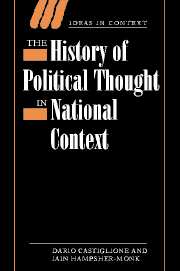Book contents
- Frontmatter
- Contents
- List of contributors
- Preface
- 1 Introduction The history of political thought and the national discourses of politics
- 2 The voice of the ‘Greeks’ in the conversation of mankind
- 3 History of political theory in the Federal Republic of Germany: strange death and slow recovery
- 4 A German version of the ‘linguistic turn’: Reinhart Koselleck and the history of political and social concepts (Begriffsgeschichte)
- 5 One hundred years of the history of political thought in Italy
- 6 Discordant voices: American histories of political thought
- 7 The professoriate of political thought in England since 1914: a tale of three chairs
- 8 The history of political thought and the political history of thought
- 9 The rise of, challenge to and prospects for a Collingwoodian approach to the history of political thought
- 10 Towards a philosophical history of the political
- 11 ‘Le retour des émigrés’? The study of the history of political ideas in contemporary France
- 12 National political cultures and regime changes in Eastern and Central Europe
- 13 The limits of the national paradigm in the study of political thought: the case of Karl Popper and Central European cosmopolitanism
- 14 Postscript. Disciplines, canons and publics: the history of ‘the history of political thought’ in comparative perspective
- Index
- IDEAS IN CONTEXT
3 - History of political theory in the Federal Republic of Germany: strange death and slow recovery
Published online by Cambridge University Press: 23 September 2009
- Frontmatter
- Contents
- List of contributors
- Preface
- 1 Introduction The history of political thought and the national discourses of politics
- 2 The voice of the ‘Greeks’ in the conversation of mankind
- 3 History of political theory in the Federal Republic of Germany: strange death and slow recovery
- 4 A German version of the ‘linguistic turn’: Reinhart Koselleck and the history of political and social concepts (Begriffsgeschichte)
- 5 One hundred years of the history of political thought in Italy
- 6 Discordant voices: American histories of political thought
- 7 The professoriate of political thought in England since 1914: a tale of three chairs
- 8 The history of political thought and the political history of thought
- 9 The rise of, challenge to and prospects for a Collingwoodian approach to the history of political thought
- 10 Towards a philosophical history of the political
- 11 ‘Le retour des émigrés’? The study of the history of political ideas in contemporary France
- 12 National political cultures and regime changes in Eastern and Central Europe
- 13 The limits of the national paradigm in the study of political thought: the case of Karl Popper and Central European cosmopolitanism
- 14 Postscript. Disciplines, canons and publics: the history of ‘the history of political thought’ in comparative perspective
- Index
- IDEAS IN CONTEXT
Summary
Intellectual developments in Germany during the period after the Second World War were overshadowed by the search for the causes for the rise of National Socialism and its ability to hold the Germans under its sway for more than a decade. The Allied policies of ‘re-education’, attempting to bring about the intellectual re-orientation of the Germans away from their past nationalist tendencies, towards more Wester-noriented political ideas were welcomed by many, as they seemed to offer a way out of the disaster, and all the more as they supported the Germans' very own liberal and democratic traditions, which had been long suppressed but which now experienced a quick recovery.
Even so, there was no sudden rupture with the past. Traditional authoritarian and nationalist views did not disappear overnight, neither in the public at large, nor among academics. Indeed, some of the dominant intellectual figures of the late 1920s raised their voices again, and initially there were but few others. The philosopher Arnold Gehlen propagated a social anthropology which lent intellectual support to the idea of an authoritarian society. Alfred Weber's cultural sociology was becoming very popular, even though it was strongly reminiscent of the intellectual climate of the 1920s. Its thrust was directed against modern technocratic society, which was allegedly about to destroy European individualistic culture as it was known. Its underlying cultural pessimism, reflecting Weber's regret of what he considered to be the progressive alienation in industrial society of the natural roots of human beings, did not necessarily favour the emergence in Federal Germany of a Western-modelled democratic society.
- Type
- Chapter
- Information
- The History of Political Thought in National Context , pp. 40 - 57Publisher: Cambridge University PressPrint publication year: 2001
- 2
- Cited by

